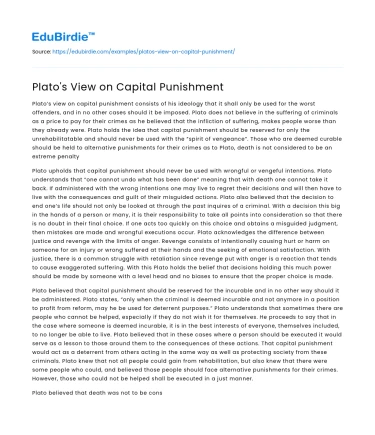Plato’s view on capital punishment consists of his ideology that it shall only be used for the worst offenders, and in no other cases should it be imposed. Plato does not believe in the suffering of criminals as a price to pay for their crimes as he believed that the infliction of suffering, makes people worse than they already were. Plato holds the idea that capital punishment should be reserved for only the unrehabilitatable and should never be used with the “spirit of vengeance”. Those who are deemed curable should be held to alternative punishments for their crimes as to Plato, death is not considered to be an extreme penalty
Plato upholds that capital punishment should never be used with wrongful or vengeful intentions. Plato understands that “one cannot undo what has been done” meaning that with death one cannot take it back. If administered with the wrong intentions one may live to regret their decisions and will then have to live with the consequences and guilt of their misguided actions. Plato also believed that the decision to end one’s life should not only be looked at through the past inquires of a criminal. With a decision this big in the hands of a person or many, it is their responsibility to take all points into consideration so that there is no doubt in their final choice. If one acts too quickly on this choice and obtains a misguided judgment, then mistakes are made and wrongful executions occur. Plato acknowledges the difference between justice and revenge with the limits of anger. Revenge consists of intentionally causing hurt or harm on someone for an injury or wrong suffered at their hands and the seeking of emotional satisfaction. With justice, there is a common struggle with retaliation since revenge put with anger is a reaction that tends to cause exaggerated suffering. With this Plato holds the belief that decisions holding this much power should be made by someone with a level head and no biases to ensure that the proper choice is made.
Save your time!
We can take care of your essay
- Proper editing and formatting
- Free revision, title page, and bibliography
- Flexible prices and money-back guarantee
Plato believed that capital punishment should be reserved for the incurable and in no other way should it be administered. Plato states, “only when the criminal is deemed incurable and not anymore in a position to profit from reform, may he be used for deterrent purposes.” Plato understands that sometimes there are people who cannot be helped, especially if they do not wish it for themselves. He proceeds to say that in the case where someone is deemed incurable, it is in the best interests of everyone, themselves included, to no longer be able to live. Plato believed that in these cases where a person should be executed it would serve as a lesson to those around them to the consequences of these actions. That capital punishment would act as a deterrent from others acting in the same way as well as protecting society from these criminals. Plato knew that not all people could gain from rehabilitation, but also knew that there were some people who could, and believed those people should face alternative punishments for their crimes. However, those who could not be helped shall be executed in a just manner.
Plato believed that death was not to be considered an extreme penalty as alternative approaches could be worse in his eyes. Plato states, “Death, however, is not an extreme penalty: the sufferings said to be in store for these people in the world to come are much more extreme than that.” and, “I conclude, therefore, that the punishments men suffer for these crimes here on earth while they are alive should as far as possible equal the penalties beyond the grave.” This means that Plato considered death to be somewhat of an easy way out. It allows criminals to escape the sufferings of pain, guilt, regret, and more, that they would endure living with the consequences of their actions for the rest of their lives. However, he acknowledges that in cases where one is deemed incurable the path for them is clear within his eyes. The only answer for them is to no longer have the right to live. While Plato is opposed to retributive punishment, which is designed to make a criminal suffer for the price of their crimes, the suffering that he refers to here with being more extreme than death are those of a mental state. Meaning that internal pain of guilt, remorse, or any other emotions, could be all-consuming of one who is forced to live with the punishments of one’s actions. There is no extent of the feelings or emotions one feels within that correspond to the crime committed. They may feel nothing at all, they may feel it all too much. This to Plato is a distinguishing factor between the incurable and curable. Therefore, mental sufferings hold more penalty in Plato’s eyes than the sufferings of death, where one can escape what they would have had to come face to face with, with an escape route.
In conclusion, Plato believed that capital punishment should only be held within the hands of those who hold no vengeance, as that is the only way to assure just punishment. As well, he believed that there will always be criminals who simply cannot be helped with changing their violent tendencies and behaviors. In these cases, the only solution is for those criminals to no longer obtain the right to live. However, in the light of one being deemed curable through rehabilitation and education, alternative punishments should be administered. Finally, Plato acknowledges that in situations previously mentioned there is a need for capital punishment, yet he deems death to be insignificant compared to the sufferings that life has to offer for such criminals.






 Stuck on your essay?
Stuck on your essay?

